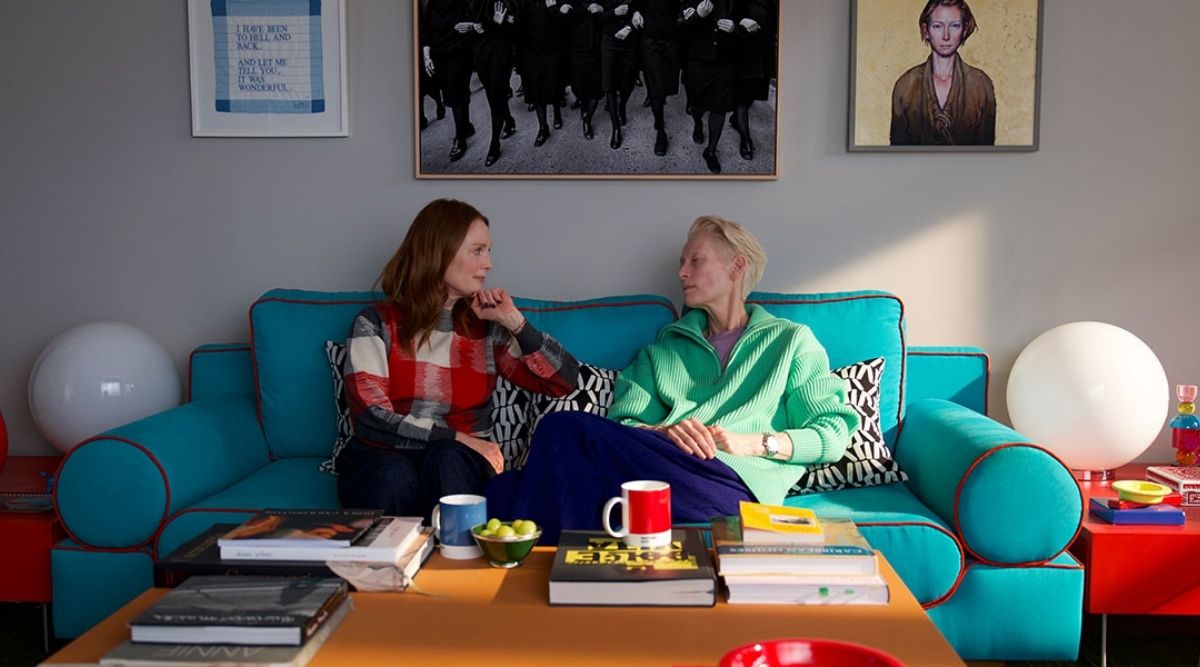Very few can capture women’s private, inner lives quite like Pedro Almodóvar. Both lush in style and complex in form, his melodramas are filtered through a kaleidoscope of heartbreaking choices and revelations. Both a master of evocation and provocation, his latest feature, The Room Next Door, trains his trademarked lens on the kind cruelty of euthanasia. It unfolds as his most intimate and sequestered film, a stream of personal, secluded conversations that sometimes crescendo with profundity.
Yet, it also finds Almodóvar operating on low volume, struggling to tap into the shock, awe, and impact his work is known for. In his English-language feature debut, resonance is lost in translation. Yet, even if The Room Next Door is a minor entry in his canon, Almodóvar still understands how to stir and scintillate—illuminating the truths of life through death.
In this adaptation of Sigrid Nunez’s novel, What Are You Going Through, Julianne Moore plays Ingrid, an author whose fear of expiration manifests in a best-selling book. After she learns that her estranged friend Martha (Tilda Swinton), an ex-war correspondent, has cancer, Ingrid visits her, rekindling their lost connection. The two are drawn closer with each story and secret told, each intimate conversation touching on past lovers, loved ones, and their relationship with mortality. Fed up with constant, debilitating treatment, Martha decides she deserves a good death. She illegally purchases a euthanasia pill and asks Ingrid to accompany her during her final month in an idyllic upstate New York Rental. It’s an ask that weighs on Ingrid but gives way to the magic of life.
The Room Next Door could have been a dreary and drab experience, but under Almodóvar’s eye, discussions of death have never burst with such colour. It’s a carefully constructed work, one whose intricate, polychromatic design informs its commentary on the beauty of mortality and, by proxy, life. Along with cinematographer Eduard Grau, Almodóvar makes deft use of glassed reflections as if conjuring the faint spirit that has already left Martha. In a late scene, Ingrid tells Martha, “It’s too soon to refer to yourself as a ghost.” But with each textured frame, Almodóvar asks: Is it?
The Room Next Door is as haunting as it is soothing, settling into a dreamlike state that’s both inviting and unmooring—especially in a goosebump-inducing sequence where our characters marvel at pink snowflakes. It’s as if Almodóvar’s film exists in the “in-between,” fixated on the end of things while clinging to the splendour of existence. Each luminous, detailed piece of clothing and furniture is part of a much larger, enchanting patchwork on the nature of existence. At each turn, Almodóvar contends that to grasp life truly, we must also have the freedom to end it. It’s an opinion Alberto Iglesias’s swooning, ethereal score reinforces, with each note resting on the pauses, revelations, and concessions embedded in Ingrid and Martha’s conversations.

At points, The Room Next Door is home to some of the greatest moments in Almodóvar’s career, full of insightful, astute viewpoints delivered with a rich sense of style. But, in leaving the Iberian Peninsula for the United States, their impact feels lost in the shuffle. Much of it results from some hokey, hammy dialogue—especially during flashbacks to Martha’s past romances. Almodóvar is no stranger to campy melodrama but juxtaposed with the layered conversations between Ingrid and Martha; it makes for a jarring and uneven experience. The Room Next Door constantly shifts between sublimity and apathy, as if caught in purgatory, building towards excellence only to be muted by stilted choices—ultimately limiting the power of its clever observations.
Swinton and Moore prove themselves to be the only performers capable of elevating the film’s lapses in tone and dialogue. The two breathe life into such flawed, fascinating women, with the subtlest gestures holding a world of indiscretion and empathy. Swinton’s reserved, stoic presence offers a meaty foil for Moore’s compassionate, determined but frightened author. The Room Next Door is at its most spellbinding when we are immersed in its twisty, conversational cadence. The always great John Turturro also shines as one of Almodóvar’s funniest characters, a former lover of the women turned climate change lecturer.
The quiet, stirring charms of The Room Next Door embody the latter stage of an auteur’s career, where transience and impermanence take center stage. As time ticks away, the impact may weaken, but emotion remains large and vibrant for Almodóvar. While a lesser outing, there’s no denying the film’s ability to intoxicate and make us question “The point of waiting, if [we’re] ready to go.”
The Room Next Door screened as part of the 2024 Toronto International Film Festival and will release in theatres on December 20th.
The Room Next Door
-
Rating - 6.5/106.5/10
TL;DR
The quiet, stirring charms of The Room Next Door embody the latter stage of an auteur’s career, where transience and impermanence take center stage.





